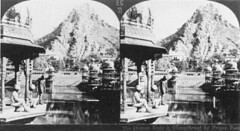
Originally uploaded by .Kerri..
7/20/05. It seems important to begin with the date because the air outside is an ashen tornado-colored dusk, from what I can see between my building and the highrise to the south anyway. A color that suggests rain to an amnesiac summer. I have played hooky today, and even though it is past the hour of my usual return from work, this still feels like giddy, stolen time. Hooky because J & I were up talking from 5:30 last night to 4:30 this morning. Well, a talk dotted with incomplete movie viewing, dinner making, wine... It has taken me a full day to recover; The headache is the facemask-of-plate-tectonics variety. Reading Matthew Goulish's "39 Microlectures in proximity of performance" is having an antidotal effect... the perfect remedy to days/months of creative malaise is now seeing the disparate collectings in blogland, notebooks, photos and memory being able to be conjured into relation.
So in my condition today- a waning attention- I've thumbed through the New Yorker, a Pottery Barn catalog, and a book about Paris that is sadly a surrealist hack job at travel writing, but happily, at least, beautifully made as a physical object. All have concluded with drowsiness. In and out of the nap state. A perfect day if not for convalescing. So I'm reading the Microlectures from the beginning (even though he states in the intro that the book can be read in any order, stickler, traditionalist me...what non-linear poet is this that is so compelled to revere the book object with such orthodoxy?) and around pages 34, 35 my vision begins to trail and blur into a stereoscope of text from each page. At this point I should research and say something about stereoscopic photography or the physiology of the human ocular system. Instead, the ideas that got up and met in my vision of the text were a. the informed vs. the ecstatic artist/audience and what has led me to think that the ecstatic response is more desirable. And Ernesto, b., a fictional boy reading a book with a hole burned through its center by a molten instrument. Which reminds me of the time J & I obscured most of our TV (already dinky) to watch only the top 2 inches of television. Since we don't have cable, it made our limited network choices more interesting.
I have to include this paragraph from one of Goulish's lectures on Multiplicity because the sidebars to follow spun initially from it and depend on it (parasitically).
"If we picture our lives taking place on a calendar-a desk calendar, the kind with one date on each page, and all the pages stacked up-if we picture each day of our lives taking place on the surface of these pages-and we drill out and remove a core sample of this calendar at any particular moment-for example, that moment when one wakes up in the morning and gets out of bed-then we line up all these moments in a row-one could see oneself in a kind of film, each frame of which shows a different picture of one getting out of bed in the morning. In this way, one could say, 'I am always waking up. I am always getting out of bed. Every time it's different. This is my life.'"
Wasn't there a film- starring Robin Williams- that had a scene just like this? RW plays an editor who cuts the films of people's lives into an uplifting funeral homage once the individual dies (and their brain chip that's been recording their lives has been removed). I didn't say it was a good picture, but it was these moments, the daily pause in front of the bathroom mirror in the morning that were the outtakes RW's character personally collected. I don't know. Is this a movie?
And who said, "there is no such thing as repetition?" I take this to be because of the ever-changing context for the similar gesture provided by time. Googling the quote to find the sayer (Gertrude Stein) I am taken to a website for BookForum, spring 2003. It is an interview with Alain Robbe-Grillet whose book The Voyeur I happen to be presently reading, and the complete quote is, "there is no such thing as repetition, only insistence." Also called up by the Google search: "American Rhetoric: Theodore Roosevelt-The Man with the Muck-rake," "Mantra Japa by Swami Krishnananda," and "Myths of Individualism." All sound like interesting articles I would not have felt connected to otherwise. Kind of like my recent practice of reading the New York Times online beginning with "the most emailed articles."
If we do accept the idea of repetition however, how do we know when we've detected enough resemblance to say that something repeats? This reminds me of a news story on NPR a few months ago that J recounted to me. After receiving many customer complaints that the I-Pod shuffle function may not be truly random because individuals claimed to hear the same song often replayed, a team of scientists took up the task of seeing whether it did in fact repeat songs as mathematically often as people perceived. Their conclusion: repetition doesn't occur as often as we perceive. The human mind is apparently overly eager to pick out repetition and find patterns in random activity. Does this mean we are biologically predisposed to fear chaos?
0 Comments:
Post a Comment
<< Home